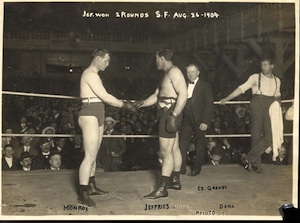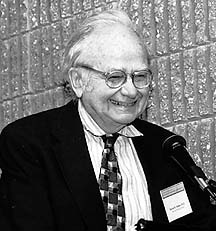24 Sep Nobel laureate David Hubel
I like to think my home town of Kempt Head (pop. 21) is the smallest place on earth to boast both a heavyweight champion of the world and a Nobel Prize winner. The champ, who was also a war hero, died in 1942. We lost the Nobel laureate this week.
 The heavyweight champ was of the unofficial variety. Jack Munroe was born June 21, 1877, at Munroe’s Hill, Kempt Head. In December, 1902, he was working at a mining camp in Montana when the heavyweight champion of the day, Jim Jeffries, passed through Butte on a barnstorming tour. In each city, Jeffries offered a local boxer the chance to spar with him, with a cash prize to any who could last four rounds.
The heavyweight champ was of the unofficial variety. Jack Munroe was born June 21, 1877, at Munroe’s Hill, Kempt Head. In December, 1902, he was working at a mining camp in Montana when the heavyweight champion of the day, Jim Jeffries, passed through Butte on a barnstorming tour. In each city, Jeffries offered a local boxer the chance to spar with him, with a cash prize to any who could last four rounds.
On December 20, 1902, at Button’s Broadway Theatre, Munroe, a strapping lad with a bit of amateur boxing experience, not only lasted four rounds, he actually knocked Jeffries down in the final frame. The local newspaper claimed the ref, a member of Jeffries entourage, had given the champ a long count. An Associated Press version of that story triggered a national sensation, forcing Jeffries to give Munroe a rematch. On August 26, 1904, at Mechanics Pavilion in San Francisco, he dispatched the Cape Breton Miner in two merciless rounds.
 The Nobel laureate was David H. Hubel, a Harvard Medical School neurologist who, in the 1990s, bought a summer cottage at Munroe’s Hill, Kempt Head, a stone’s throw from Jack Munroe’s birthplace. The modest bungalow had a clear view of Alexander Graham Bell’s summer residence on the opposite shore of the Great Bras d’Or Channel.
The Nobel laureate was David H. Hubel, a Harvard Medical School neurologist who, in the 1990s, bought a summer cottage at Munroe’s Hill, Kempt Head, a stone’s throw from Jack Munroe’s birthplace. The modest bungalow had a clear view of Alexander Graham Bell’s summer residence on the opposite shore of the Great Bras d’Or Channel.
In 1981, Hubel and his colleague Torsten Wiesel shared the Nobel Prize for Medicine for what the prize committee described as research that “disclosed one of the most well guarded secrets of the brain: the way by which its cells decode the message which the brain receives from the eyes.”
The Washington Post added more detail:
Starting in the late 1950s, Dr. Hubel’s research revealed the architecture of the visual cortex, the region of the brain that receives floods of data gathered by the eyes.
Together with Swedish neurophysiologist Torsten N. Wiesel, he discovered how nerve cells — neurons — analyze the light rays that hit our retinas, bit by bit, to assemble the detailed, moving and almost infinitely diverse final images that we perceive as our external world.
Over 25 years of work together, the men revealed that the cortex is arranged in vertical columns of cells, each module devoted to process a different constituent of the seen world: form, contour, color, movement and three-dimensionality.
Professor Hubel and his wife Ruth, who died last February, spent their summers months quietly at Kempt Head. There was nothing pretentious about them. The professor’s unruly shock of white hair and slightly dishevelled appearance were a familiar sight at community events like the Ross Ferry Firefighters’ Famous Pork Barbecue. You can get a sense of his gentle, self-effacing humour from a charming autobiography he wrote at the time of the Nobel award.
David Hubel died Sunday in Lincoln, Massachusetts, his winter home. Born in Windsor, Ontario, and raised in Montreal, he moved to the US to attend Johns Hopkin’s University. His obituary in the Boston Globe reports:
David loved learning and had numerous interests. He was fluent in French and German, and once gave a scientific lecture in Japan in Japanese. He loved to read and to travel. He played the piano, recorder and flute, and in 2013 took up the oboe.
He was an avid astronomer (and built his own telescope tracking system to keep planets continually in the field of view, which he called his gronking gadget). Partly by necessity but also for sheer enjoyment he built many of his medical research devices. He was an avid tennis player, sailor, skier, and Red Sox fan…
In his spare time he loved woodworking and to design and weave wool rugs and scarves on his loom that made for wonderful gifts. David also practiced Morse code and was a ham radio enthusiast and would teach anyone interested how to use the slide rule or abacus.
Beyond his wonderful sense of humor, perhaps his strongest legacy will be his kindness and generosity to his family, friends, his Harvard College undergraduate freshman seminar students, and his research trainees and proteges. David and Ruth were pleased to have established undergraduate science research scholarships at Dalhousie University, Wellesley College, and University of Windsor.
A remarkable man. Sincere condolences to sons Carl, Eric and Paul, and the rest of the family.
